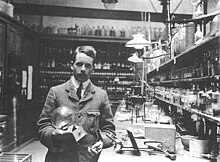
Summary
The Balliol-Trinity Laboratories in Oxford, England, was an early chemistry laboratory at the University of Oxford.[2] The laboratory was located between Balliol College and Trinity College, hence the name.[3][4] It was especially known for physical chemistry.

Chemistry was first recognized as a separate discipline at Oxford University in the 19th century. From 1855, a chemistry laboratory existed in a basement at Balliol College.[2] In 1879, Balliol and Trinity agreed to have a laboratory at the boundary of the two colleges. The laboratory became the strongest of the Oxford college research institutions in chemistry.[5] It remained in operation until the Second World War when a new Physical Chemistry Laboratory (PCL) was constructed by Oxford University in the Science Area.[2]
People edit
The following scientists of note worked in the Balliol-Trinity Laboratories:
- E. J. Bowen
- Sir John Conroy
- Sir Harold Hartley
- Sir Cyril Norman Hinshelwood (Nobel Prize winner)
- Henry Moseley
This list is incomplete; you can help by adding missing items. (August 2015) |
See also edit
- Abbot's Kitchen, Oxford, another early chemistry laboratory in Oxford
- Department of Chemistry, University of Oxford
- Physical Chemistry Laboratory, which replaced the Balliol-Trinity Laboratories
References edit
- ^ Heilbron, John L. (1974). H. G. J. Moseley: The Life and Letters of an English Physicist, 1887–1915. Berkeley & Los Angeles: University of California Press. pp. 9, 27, 29, 33, 36–38, 95. ISBN 0-520-02375-7.
- ^ a b c Bowen, Edmund J. (December 1970). "The Balliol-Trinity Laboratories 1853–1940". Notes and Records of the Royal Society of London. 25 (2): 227–236. doi:10.1098/rsnr.1970.0031. S2CID 143194112.
- ^ "Chemistry at Balliol: History". Balliol College Archives & Manuscripts. UK: Balliol College, Oxford. Retrieved 26 August 2015.
- ^ "Chemistry". UK: Trinity College, Oxford. Retrieved 26 August 2015.
- ^ Williams, Robert J. P.; Chapman, Allan; Rowlinson, John S. (2009). Chemistry at Oxford: A History from 1600 to 2005. Royal Society of Chemistry. p. 118. ISBN 978-0854041398.


